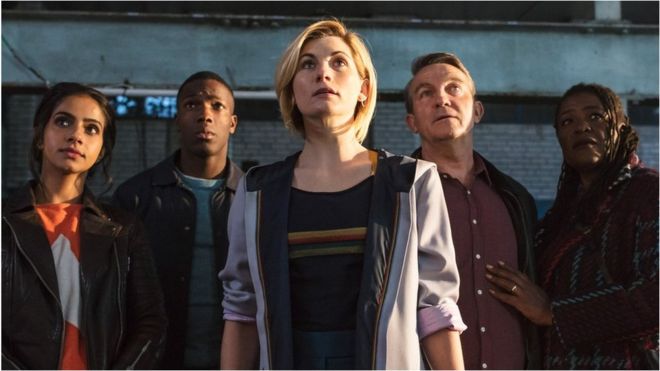A new season of Doctor Who has arrived, and with it a historic new era for the show. Never before in Doctor Who’s 55 year history has there been a female doctor, and along with the cultural significance that comes with casting Jodie Whittaker, there is also a brand new creative time behind the scenes. Yet even with the turnover behind the scenes- something Doctor Who fans are very familiar with- season 11 gets off to a strong start.
If you need a refresher on the show, an alien known only as the Doctor travels in space and time with a device called the Tardis, (Time and Relative Dimension In Space, because even time travel devices need acronyms) and hangs out with a few friends, usually known as companions. The Doctor has been portrayed by over 12 different actors (All men) since the show’s debut in 1963, all because of a plot device called regeneration. Regeneration allows the Doctor to completely change his appearance whenever he is about to die (or, more accurately, when the actor decides to leave). That concept has allowed the Doctor to have 13 different iterations, so with each casting change the doctor has a slightly different personality. Since the show changes its lead every few years, Doctor Who constantly re tools itself, yet perhaps never in quite this way.
This season was burned with extremely high expectations, largely due to the cultural significance that came with casting the doctor as a woman. Thankfully, the episode also succeeds on its own merits, both in the writing and performances. The Doctor’s gender is barely addressed in the story, as its only given two unimportant lines of dialogue. This was definitely the right way to go, as it doesn’t overwhelm the episode, nor does it go completely unoticed. As for the rest of the episode- while not flawless- it manages to both honor the storied history of the show while still charting a new direction for the series, which is exactly what a premiere episode like this should aim to do.
Much of this premiere- and most likely the season- will be viewed through the lens of Jodie Whittaker’s performance as the 13th Doctor, and rightly so. The main purpose of the episode, titled “The Woman who Fell to Earth,” is to meet Whittaker’s iteration of the doctor– a bright, smart and energetic force of nature. Both Whittaker and the writing shine in giving the character her own personality quirks while still keeping core elements of the doctor’s character intact. Whittaker herself is able to jump from serious to comedic moments expertly, which is necessary to play a character as complex as the Doctor. From the moment she appears on the screen, you can tell she was born to play the Doctor.
Of course, the Doctor isn’t the only character in this episode, as we also meet the three new companions who will eventually travel in the Tardis. In the “The Woman who Fell to Earth’s” opening moments, we’re introduced to Ryan Sinclair, (Tosin Cole) a 19-year-old who has dyspraxia, a disease that partially inhibits motor function. Outside of Whittaker, Ryan is the main character of the episode. We see his struggles, his love for his grandmother, and, importantly, his strained relationship with his step-grandfather, Graham. As the second companion for season 11, Graham is a cautious older man, and is the most hesitant of the companions when he gets caught up in the Doctor’s antics, which should prove interesting down the line. Lastly, there is Yaz (Mandip Gill). A cop bored by her life of settling parking disputes, she is constantly on the lookout for a more adventurous life, and just so happens to find it when she meets the Doctor. While we don’t get to know too much about her beyond some surface level details, she has some of the funniest lines this episode, which is always a plus. So while Ryan gets the most development, both Yaz and Graham make for compelling characters who will be interesting to watch on a week to week basis.
The one element of this episode that is less than stellar is the plot. The most glaring issue is in the pacing, as the middle of the episode jumps back and forth between the Doctor and a man who is obviously just cannon fodder for the villain of the week. We know nothing about him, and the audience is left waiting to switch back to the Doctor’s perspective and watch a far more interesting Jodie Whittaker. The villain is also pretty lackluster for something in a Doctor Who episode, which is known for its excellent monsters.
However, despite all this, the writing in The Woman who Fell to Earth is actually pretty good. At one point in the episode, Whittaker delivers a monologue on regeneration that proves just how great of an actress she really is, but that also shows just how good the writing can be. Unfortunately, while the writing for the “The Woman who Fell to Earth” swerves between average and excellent, the actual plot beats feel like they were thrown in with minimal effort, especially concerning the monster. There were simply to many issues in the premiere for it to go down as a great episode.
Even as it kicks off a brand new era of Doctor Who, “The Woman who Fell to Earth” hits the ground running. It has the ingredients needed for a great season, as Jodie Whittaker is brilliant as the 13th Doctor, the supporting cast is strong, and the writing seems to be on par with the series standards. As Doctor who looks to regenerate itself into a new show, the future is bright for the remainder of season 11.
Grade: B+













